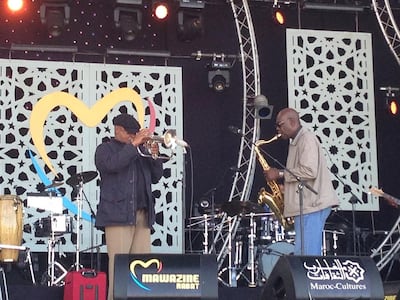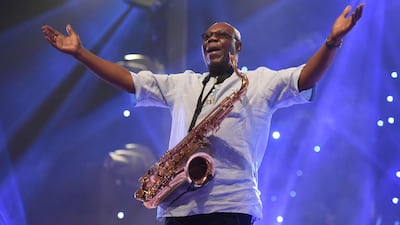Cameroonian jazz great Manu Dibango died in France on Tuesday, March 24, having contracted the coronavirus.
The news was announced on his Facebook page.
“It is with deep sadness that we announce you the loss of Manu Dibango, our Papy Groove, who passed away on 24th of March 2020, at 86 years old, further to covid 19,” read the post. “His funeral service will be held in strict privacy, and a tribute to his memory will be organized when possible."
Dibango’s passing marks the first high profile music casualty relating to the unfolding pandemic.
Fellow world music stars, Beninese singer Angélique Kidjo and Senegal's Yossu N'dour, have led tributes online.
“Dear #ManuDibango, you’ve always been there for me from my beginnings in Paris to this rehearsal just 2 months ago,” Kidjo said. “You are the original Giant of African Music and a beautiful human being.”
A devastated N'Dour described Dibango as “a big brother.”
“I don't have the words to translate all my sadness. Manu, you have been a big brother, a pride for Cameroon and for Africa as a whole. A huge loss,” he said. “I offer my sincere condolences to his family, the world of music and to the whole of Africa.”
These tributes should hopefully serve as an opportunity for a new generation to discover an enigmatic artist who played a leading role in bringing the beats and rhythms of the continent to the western world.
It was a theme I was hoping to explore when I was due to interview the great man back in 2014, on the side-lines of the Mawazine Festival in Rabat, Morocco.
I was prepared for the encounter. I read about how he was born in Cameroon before going to France as high school student and learning the saxophone, vibraphone and piano. I learned about his humility and quest for knowledge, which saw him study and perform under pioneering Afro-jazz band leader Joseph Kabasele.
It was a career defining experience that saw Dibango emerge as a fierce artist in his own right and one not defined by musical ideology
"You have to go beyond the environment which you have been shaped," he said in a 1991 interview with the now defunct UNESCO Courier magazine. "That kind of curiosity researchers have and you will find that in many professions also, not just music."
That expansive mind-set is all over his signature anthem Soul Makossa. Originally composed for the 1972 African Nations Cup, the track was an international hit due to its sophisticated melding of styles.
There was the heaving bass lines innate to Cameroonian urban music form makossa, there was the propulsive drumming and circular guitar riffs of Afrobeats and, off course, some scintillating sax work any jazz head would dig. The track's success helped lay the pathway for the present international boom of Afrobeats.
In addition to all that history, I was also looking forward to probing Dibango about his strong feelings regarding modern pop acts sampling his music without paying proper respect.
In 2009 he sued both Michael Jackson and Rihanna for stealing Soul Makossa's signature hook line - "mama-say mama-sa mama-ko-sa" - in their respective tracks, Wanna Be Startin' Somethin and Don't Stop the Music (Jackson settled, while the Rihanna case was thrown out by a French court).
Alas, by the time I arrived in Morocco, I learned the interview was cancelled due to a change in Dibango's schedule.
Perhaps moved by my crest fallen reaction, his manager allowed me the opportunity to sit in on his sound check during lunch.
It remains one of my favourite memories: there I was, the only person in an outdoor beach stage watching Dibango going through his paces alongside his special guest for that night's concert, the late South African jazz master Hugh Masekela.

It was the meeting of African music giants and I did my best not to groove along (I didn’t want to draw attention) to all that musical fire they were setting on stage. I also realised just how meticulous Dibango was. The man planned everything - even the exact moments when he would address the crowd during a particular piece.
“This is the place where I will be talking,” Dibango shouted to the band as they got into a summery lounge groove. “Here, it will be talk, talk, talk and then we go back to the other part.”
It was there that I also learned the key to Dibango’s enduring success: he knew he could always improve.
Dibango was a relentless taskmaster and I felt sorry for Masekela and the band as they did over a dozen takes of Soul Makossa, all in order to nail down a particular knotty section in the bridge. Just when I thought an increasingly frustrated Masekela would throw his trumpet at Dibango's head, the sound check was over. A grinning Dibango then walked over to Masekela to hug him. Jokes were shared, no feelings were hurt and no egos bruised.
Looking back at that moment and Dibango's pioneering career, I realised I didn’t need that interview after all - Dibango always said it best on stage.


